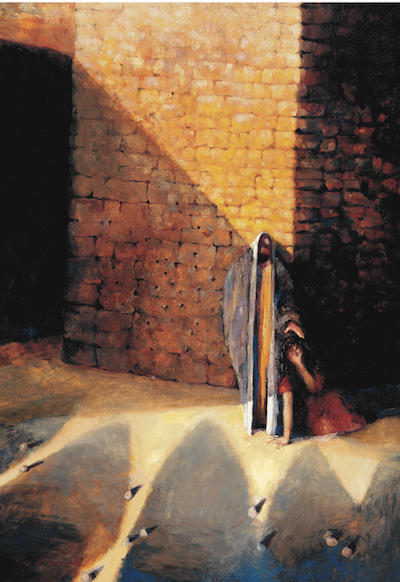We run our website the way we wished the whole internet worked: we provide high quality original content with no ads. We are funded solely by your direct support. Please consider supporting this project.

Jesus Refuted Old Testament Laws
Although it’s clear that Jesus regarded the Old Testament as the inspired word of God, he also directly challenged aspects of the Old Testament law. To illustrate, Jesus was repudiating Sabbath law when he defended his disciples’ harvesting of food on the Sabbath (Mt 12:1-14; cf. Ex. 34:21). Some scholars argue that the disciples were merely violating a Pharisaical tradition surrounding the Sabbath, not any actual OT law regarding the Sabbath. In this view, Jesus was trying to bring out the true meaning of Sabbath (i.e., showing that the Sabbath was made for humans, not humans for the Sabbath) and to demonstrate his authority as Lord of the Sabbath. While I grant that this was certainly part of Jesus’ intent, I do not see how this absolves his disciples from the charge of Sabbath-breaking. After all, according to the OT—not merely a Jewish tradition—people were to be executed merely for picking up sticks on the Sabbath (Nu 15:32-36). Moreover, Moses’ prohibition against doing work on the Sabbath explicitly included a prohibition on gathering food (i.e., manna) (Ex. 16:23-29). Hence, in this particular instance it seems the Pharisee’s had some biblical basis for their criticism of Jesus. Yes, the central intent of Jesus’ response was to bring out the true meaning of the Sabbath. But it appears its true meaning, as articulated by Jesus, stands in tension with certain meticulous and harsh laws surrounding the Sabbath in the OT. In the name of bringing out the true meaning of the Sabbath, it seems Jesus was perfectly willing to challenge these laws.
It’s worth noting that Jesus’ relaxed attitude toward certain meticulous and/or harsh laws surrounding the Sabbath as well as surrounding other matters was adopted and even expanded upon by his earliest disciples. Paul completely relativized the commandment to dedicate the seventh day of the week to God (Col. 2:16), for example. Similarly, we find early Christian leaders rejecting the OT commands for God’s covenant people, Jew and Gentile, to be circumcised, to eat particular kinds of foods, etc. Clearly, though the earliest Christian disciples regarded the OT as God’s Word, they subordinated its authority to the authority of Christ and were willing to reject parts of it when they felt the Spirit led them to do so (Ac.15:28, “it seemed good to the Holy Spirit and to us…”).
Along similar lines, it seems that Jesus functionally repudiated a law of the OT when he ingeniously prevented a woman caught in the act of adultery from being executed (Jn 8:1-11, Cf. Lev. 20:10; Deut 22:22). Jesus caught her (all male!) accusers in their self-righteousness by pointing out only people without sin are in a position to execute a sinner. Since all humans are sinners, the principle Jesus is illustrating in this episode would seem to apply not just to this particular accused sinner and this group of sinful accusers, but to all accused sinners and all sinful accusers. And this, in turn, renders it impossible to ever put into practice any of the OT’s commands to put people to death. Indeed, if followed through consistently, the principle that Jesus illustrates in this story challenges the moral justification, if not the apparent divine sanctioning, of all human-on-human killing in the Bible.
Jesus’ teachings, his death, and his resurrection radically and permanently altered the way that the early church interpreted the Old Testament. As Graeme Goldsworthy has argued, Jesus is “the goal and the fulfillment of the whole Old Testament” and is “the key to the Bible.” Therefore, everything about these laws is reinterpreted because Jesus is the center of God’s revelation, the one in whom the law is fulfilled (Matt 5:17-18).
Painting by Daniel Bonnell
Category: General
Tags: Cruciform Theology, Jesus, Old Testament
Topics: Biblical Interpretation
Related Reading

How Revelation Uses Violent Images in an Anti-Violent Way
All the violent scenes in Revelation are symbols for the battle of truth and deception. They never involve literal violence. In fact, they symbolize ANTI-VIOLENCE. The ingenious way John helps us get free of deception of trust in violent power is by taking a standard violent symbol and juxtaposing it with a symbol that undermines…

What makes the claim that Jesus rose from the dead unique?
Question: What makes the story of Jesus’ resurrection different from other pagan resurrection stories, such as those surrounding the Egyptian god Osiris? Answer: In Lord or Legend? (and more academically, The Jesus Legend), Paul Eddy and I address this, and many other, objections to faith in Jesus. I encourage you to check either of these…

Is there Archeological Support for the Reliability of the Gospels?
One of the many tests historians typically submit documents to in accessing their historical reliability concerns the extent to which archeology supports or undermines the historic claims the document makes. So we need to investigate the extent to which archeology confirms, or refutes, aspects of the Gospels. Before we address this question, however, a preliminary…

Podcast: How Does the Story of Achan In Joshua 7 Point to the Cross?
Greg looks at a violent Old Testament story through a Cruciform lens. http://traffic.libsyn.com/askgregboyd/Episode_0447.mp3

A Cruciform Magic Eye
In this post I’d like to share the story of how I came upon the thesis I’m defending in the book I’ve been working on for the last four years entitled The Crucifixion of the Warrior God: A Cruciform Theological Interpretation of the Old Testament’s Violent Divine Portraits. It’s a much longer post than usual,…

Why Did Jesus Curse The Poor Fig Tree?
Why Did Jesus Curse The Fig Tree? One of the strangest episodes recorded in the Gospels is Jesus cursing a fig tree because he was hungry and it didn’t have any figs (Mk 11:12-14; Mt 21:18-19). It’s the only destructive miracle found in the New Testament. What’s particularly puzzling is that Mark tells us the…
